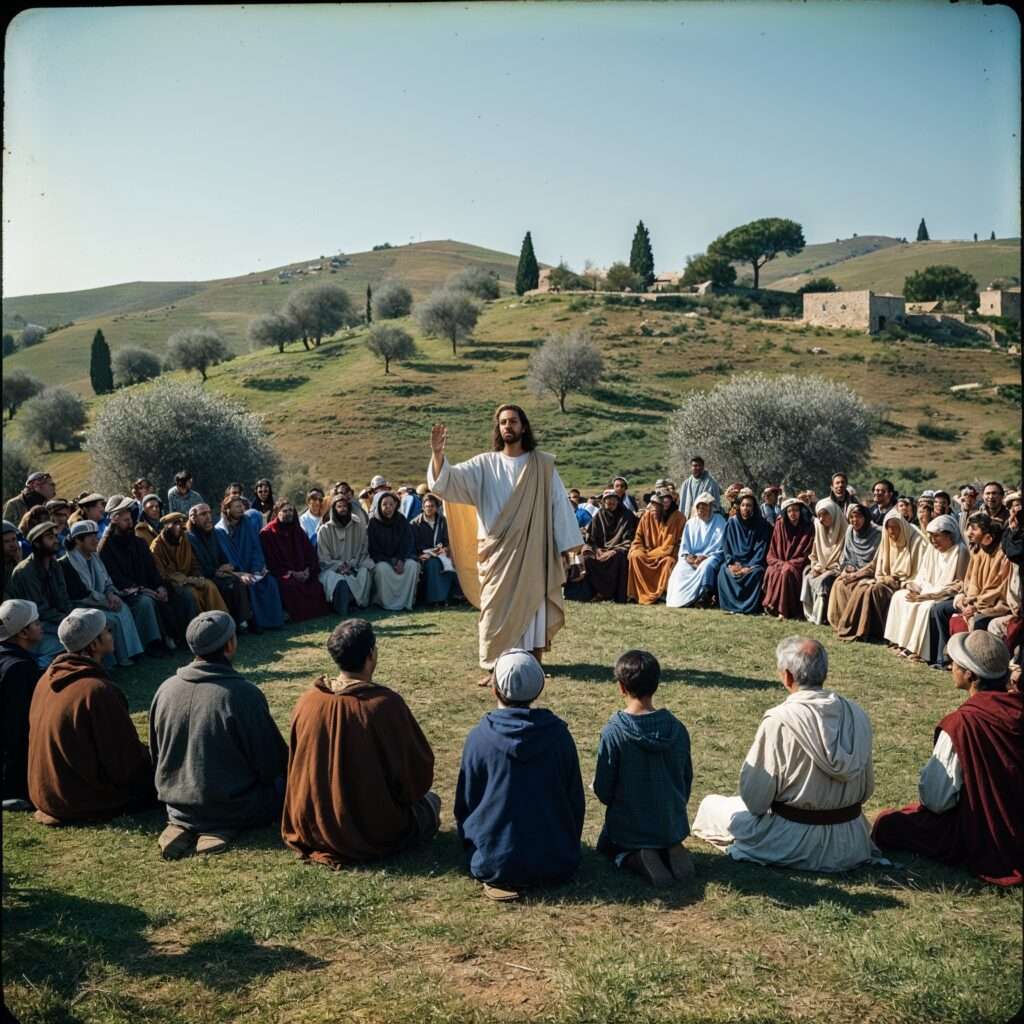
The majestic Gate of Heaven, adorned with intricate designs, gemstones, and surrounded by glowing clouds
The Kingdom of God: Present Reality and Future Hope
The Kingdom of God is one of the most profound and transformative concepts in the Bible. It encompasses both the current reality of God’s reign in the hearts of believers and the future fulfillment of His eternal kingdom. Jesus emphasized the importance of the Kingdom of God throughout His ministry, urging His followers in Matthew 6:33 to “seek first His kingdom and His righteousness.” This teaching underscores the Kingdom’s central role in the Christian faith, both as a present spiritual reality and as a future promise.
In this article, we explore the meaning of the Kingdom of God, its present application, and its future fulfillment, drawing from Jesus’ teachings and biblical prophecies.
What Is the Kingdom of God?
The Kingdom of God is not a physical location with borders or governments; instead, it refers to God’s sovereign rule wherever His will is being fulfilled. It is a spiritual reality that begins in the hearts of individuals and extends to communities and the world. When people live according to God’s love, values, and purposes—demonstrating compassion, forgiveness, and justice—they are actively living out the Kingdom of God.
The Present Reality of the Kingdom
The Kingdom of God is already here among us. Jesus declared in Luke 17:21, “The Kingdom of God is in your midst,” highlighting its immediate and spiritual nature. Whenever acts of love, mercy, and justice occur, the Kingdom becomes visible in our world.
Living in the Kingdom Daily
- Helping a neighbor in need.
- Forgiving someone who has wronged you.
- Working toward social justice or aiding the marginalized.
These acts reflect God’s will and bring His Kingdom into our daily lives.
Jesus’ Parables About the Kingdom of God
Jesus often used parables to explain the nature of the Kingdom of God, comparing it to ordinary yet profound examples to help us understand its meaning and growth.
The Mustard Seed and Yeast
In Matthew 13:31-32, Jesus described the Kingdom as a mustard seed that starts small but grows into a large tree, providing shelter and shade. Similarly, He likened it to yeast that transforms an entire batch of dough (Luke 13:20-21). These analogies emphasize the transformative power of the Kingdom, showing how small beginnings can lead to significant change.
The Hidden Treasure and the Pearl of Great Value
In Matthew 13:44-46, Jesus compared the Kingdom to a treasure hidden in a field and a pearl of great price. These parables illustrate the immense worth of the Kingdom and the sacrifices necessary to fully embrace it.
The Vine and the Branches
In John 15:5, Jesus described Himself as the vine and His followers as the branches. The Kingdom grows as believers stay connected to Christ, bearing fruit in their lives—acts of love, service, and justice that reflect God’s reign.
The Future Fulfillment of the Kingdom of God
While the Kingdom of God is present now, it will reach its ultimate fulfillment in the future. Jesus spoke of a time when God’s rule would be fully realized, transforming the brokenness of the world into wholeness and harmony.
A Promise of Hope
The future Kingdom is described as a place of peace, justice, and healing. In Revelation 21:4, we read, “There will be no more death or mourning or crying or pain, for the old order of things has passed away.” This promise of restoration gives believers hope and motivates them to live in alignment with God’s will.
The Wedding Feast
In Matthew 22:2-14, Jesus likened the future Kingdom to a wedding feast, symbolizing the joy, unity, and celebration that will characterize God’s eternal reign. This imagery reminds believers of the ultimate gathering of God’s people in His presence.
Living in the Kingdom of God Today
Jesus calls us to live as citizens of the Kingdom right now, actively participating in His mission to bring love, justice, and mercy into the world.
Practical Ways to Live in the Kingdom
- Be an Ambassador for Christ: 2 Corinthians 5:20 reminds us that Christians are ambassadors of the Kingdom, representing God’s values in the world.
- Show Kindness and Compassion: Small acts of kindness reflect God’s love and advance His Kingdom.
- Pursue Justice and Peace: Advocate for what is right and work to heal divisions in your community.
Salt and Light
In Matthew 5:13-16, Jesus described believers as the salt of the earth and the light of the world. Salt preserves goodness, and light illuminates truth. By living as salt and light, Christians demonstrate the transformative power of the Kingdom and invite others to experience it.

Comparing the Present and Future Kingdom of God
The God’s Kingdom bridges the gap between the present and the future. It is here now, visible in acts of love and justice, but it will one day be fully realized when Christ returns.
| Aspect | Present Kingdom | Future Kingdom |
|---|---|---|
| Nature | Spiritual reality; visible in acts of love, mercy, and justice. | Physical and spiritual restoration of all creation. |
| Fulfillment | Ongoing through the lives of believers. | Completed when Christ returns to establish His reign. |
| Scriptural Basis | Luke 17:21, Matthew 6:33 | Revelation 21:1-4, Matthew 22:2-14 |
| Key Features | Righteousness, peace, and joy in the Holy Spirit. | No pain, death, or suffering; perfect harmony. |
The Kingdom of God: A Life-Changing Reality
The Kingdom is not just a concept or a future hope—it’s a transformative way of life that starts here and now. By living according to God’s will, we bring glimpses of the Kingdom into the present and point others toward the hope of its future fulfillment.
As Jesus said in Matthew 6:33, “Seek first His kingdom and His righteousness.” This call challenges us to prioritize God’s reign in every aspect of our lives, allowing His love, mercy, and justice to shape our actions.
DARWIN’S Take: The Kingdom That Transcends
The Kingdom of God isn’t bound by time, space, or politics. It’s an invisible force turning the selfish world upside-down. It’s the mustard seed growing into a mighty tree, the yeast spreading transformation, the treasure hidden in plain sight. Yet it’s also a waiting game—a divine paradox. We’re living it now, but we’re yearning for its perfection.
Here’s the kicker: Are you living like the Kingdom is here? Or are you still looking for it in the wrong places—power, money, control? The Kingdom of God isn’t in the headlines. It’s in the quiet moments where forgiveness triumphs, love breaks through, and justice is done. It’s a revolution, one heart at a time.
The Kingdom’s message is clear: Align yourself with the eternal or get lost in the temporary. The choice, though deceptively simple, has cosmic consequences. Don’t just admire the Kingdom—step into it.
Sources
- Bible Gateway: Matthew 6:33
Explore the foundational verse where Jesus urges believers to seek the Kingdom of God first.
Read more - GotQuestions: What Is the Kingdom of God?
A concise explanation of the spiritual and future dimensions of the Kingdom of God.
Read more - Blue Letter Bible: The Kingdom of God
Study tools and in-depth commentaries exploring the Kingdom’s dual reality.
Read more - Desiring God: What Is the Kingdom of God?
Reflects on what it means to live as a citizen of God’s Kingdom in the here and now.
Read more - Christianity.com: What Is the Kingdom of God? Understanding Its Meaning
Insightful explanations of Jesus’ teachings and parables about the Kingdom.
Read more - Ligonier Ministries: What Is the Kingdom of God?
Offers theological perspectives on the Kingdom and its role in Christian life.
Read more
These resources provide in-depth insights into the Kingdom of God, enhancing your understanding of its present reality and future hope.
Internal Sources for Further Reading
- Eternal Kingdom: Life in the New Creation
Explore the concept of the eternal Kingdom and how it connects to the Kingdom of God as described in the Bible. - Throne of the Kingdom of Heaven: A Biblical Exploration
Dive into the throne imagery and the tangible reality of the Kingdom of Heaven. - Heavenly Body After Death: Biblical Insights
Understand how the promise of resurrection ties into the future Kingdom of God. - The Second Coming: Signs and Prophecies
Discover how the Kingdom of God relates to the Second Coming of Jesus and the fulfillment of prophecy. - The Second Coming of Jesus: Fulfilled Prophecies
Investigate how the promises of the Kingdom align with the prophecies of Christ’s return.
Frequently Asked Questions (FAQ) About the Kingdom of God
1. What is the Kingdom of God according to the Bible?
The Kingdom of God refers to God’s sovereign rule over all creation, both as a present spiritual reality and a future physical manifestation. It is not confined to a single location but is evident wherever God’s will is done. For instance, Jesus stated in Luke 17:21 that “the Kingdom of God is within you,” emphasizing its spiritual nature. Simultaneously, Revelation 21:1-4 points to a future fulfillment, where God’s reign will transform creation into a new heaven and earth.
The Kingdom is a dynamic concept. It begins with the hearts of believers aligning with God’s will and culminates in the eternal restoration of all things. It encompasses God’s rule, justice, mercy, and love being fully realized.
2. Is the Kingdom of God a place or a way of life?
The Kingdom of God is both a spiritual reality and a way of life. It is not defined by physical borders or human governments but is instead where God’s authority is acknowledged. Living in the Kingdom means embodying values such as love, justice, and mercy in everyday interactions.
For example, in Matthew 6:33, Jesus urges His followers to “seek first the Kingdom of God and His righteousness.” This means prioritizing a life that reflects God’s character, including acts of kindness, forgiveness, and humility. While the Kingdom of God will have a tangible aspect in the future, as described in Revelation 21, it begins in the present through our actions and spiritual transformation.
3. How is the Kingdom of God present today?
The Kingdom of God is present wherever people live in accordance with God’s will. Every act of love, justice, and compassion reflects the Kingdom at work. When communities come together to care for the poor, forgive debts, or reconcile conflicts, they demonstrate the principles of the Kingdom.
Jesus illustrated this concept in His parables, such as the mustard seed and yeast (Matthew 13:31-33). These stories reveal that the Kingdom often starts small—perhaps in a single act of kindness—but grows to impact the world in profound ways. It is a reminder that even the smallest steps taken in faith can have eternal significance.
4. How does the Kingdom of God relate to the eternal Kingdom?
The present Kingdom of God is a foretaste of the eternal Kingdom promised in Scripture. Today, we experience glimpses of God’s reign when His will is done, but the fullness of the Kingdom will only be realized in the future. Revelation 21:1-5 describes the eternal Kingdom as a place of complete restoration, where God will dwell among His people, and there will be no more pain, suffering, or death.
This duality of “already but not yet” is central to understanding the Kingdom of God. While it is present and active now, its complete fulfillment will bring eternal peace and justice, uniting heaven and earth under God’s perfect rule.
5. What does Jesus say about entering the Kingdom of God?
Jesus emphasizes that entering the Kingdom of God requires repentance, faith, and spiritual rebirth. In John 3:5, He declares, “No one can enter the Kingdom of God unless they are born of water and the Spirit.” This highlights the transformative process of salvation, where individuals turn from sin and embrace a new life in Christ.
In addition, Jesus frequently taught about the cost of discipleship. In Luke 9:23, He states, “Whoever wants to be my disciple must deny themselves and take up their cross daily and follow me.” This underscores that entering the Kingdom involves surrendering our own desires and aligning our lives with God’s purposes.
6. What is the relationship between the Kingdom of God and the Church?
The Church serves as an earthly expression of the Kingdom of God. It is a community of believers called to live out God’s values and advance His mission in the world. Matthew 16:18-19 emphasizes the Church’s role in spreading the Kingdom, as Jesus tells Peter, “I will give you the keys of the Kingdom of Heaven.”
Through worship, discipleship, and acts of service, the Church reflects the Kingdom’s principles. However, it is important to note that the Church is not the entirety of the Kingdom. The Kingdom extends beyond human institutions, encompassing all aspects of creation under God’s rule.
7. What are some signs of the Kingdom of God?
The Kingdom of God is evident in various ways, including:
- Acts of Love and Justice: When people forgive, reconcile, and stand up for the oppressed, they reveal God’s Kingdom.
- Transformation of Lives: Changed hearts and renewed minds reflect the Kingdom’s power to restore and heal.
- Preaching of the Gospel: Spreading the good news of Jesus Christ fulfills His commission and advances the Kingdom.
In Luke 4:18-19, Jesus declared that His mission was to “proclaim good news to the poor” and “set the oppressed free.” These actions are signs that the Kingdom is breaking into the world, even amidst its brokenness.
8. How is the Kingdom of God different from the Kingdom of Heaven?
The terms “Kingdom of God” and “Kingdom of Heaven” are often used interchangeably in Scripture. However, “Kingdom of Heaven” is primarily used in Matthew’s Gospel, reflecting a sensitivity to Jewish audiences who avoided directly mentioning God’s name. Despite this linguistic difference, both terms refer to the same reality: God’s reign over creation.
9. What role does the Kingdom of God play in the future?
The Kingdom of God will reach its fullness in the future when Christ returns. At this time, all sin, suffering, and death will be eradicated, and God’s rule will be fully established. Revelation 22:3-5 describes the eternal Kingdom as a place of unending worship, joy, and peace, where believers will reign with Christ forever.
This future aspect of the Kingdom gives Christians hope and motivates them to live faithfully today, knowing that their efforts align with God’s ultimate plan for restoration.
10. How can Christians live out the Kingdom of God today?
Christians live out the Kingdom by practicing love, forgiveness, and justice in their daily lives. As Jesus taught in Matthew 5:13-16, believers are called to be “salt and light,” preserving goodness and illuminating truth in a world that often lacks hope and direction.
Practical steps include:
- Showing Compassion: Helping those in need reflects God’s mercy.
- Advocating for Justice: Standing against oppression aligns with God’s righteousness.
- Sharing the Gospel: Spreading the message of salvation expands the Kingdom’s reach.
By embodying these principles, Christians act as ambassadors of God’s Kingdom, bringing His presence into every corner of the world.


